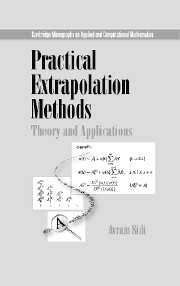Book contents
- Frontmatter
- Contents
- Preface
- Introduction
- I The Richardson Extrapolation Process and Its Generalizations
- 1 The Richardson Extrapolation Process
- 2 Additional Topics in Richardson Extrapolation
- 3 First Generalization of the Richardson Extrapolation Process
- 4 GREP: Further Generalization of the Richardson Extrapolation Process
- 5 The D-Transformation: A GREP for Infinite-Range Integrals
- 6 The d-Transformation: A GREP for Infinite Series and Sequences
- 7 Recursive Algorithms for GREP
- 8 Analytic Study of GREP(1): Slowly Varying A(y) ∊ F(1)
- 9 Analytic Study of GREP(1): Quickly Varying A(y) ∊ F(1)
- 10 Efficient Use of GREP(1): Applications to the D(1)-, d(1)-, and d̃(m)-Transformations
- 11 Reduction of the D-Transformation for Oscillatory Infinite-Range Integrals: The D̅-, D̃-, W-, and mW-Transformations
- 12 Acceleration of Convergence of Power Series by the d-Transformation: Rational d-Approximants
- 13 Acceleration of Convergence of Fourier and Generalized Fourier Series by the d-Transformation: The Complex Series Approach with APS
- 14 Special Topics in Richardson Extrapolation
- II Sequence Transformations
- III Further Applications
- IV Appendices
- Bibliography
- Index
8 - Analytic Study of GREP(1): Slowly Varying A(y) ∊ F(1)
from I - The Richardson Extrapolation Process and Its Generalizations
Published online by Cambridge University Press: 25 February 2010
- Frontmatter
- Contents
- Preface
- Introduction
- I The Richardson Extrapolation Process and Its Generalizations
- 1 The Richardson Extrapolation Process
- 2 Additional Topics in Richardson Extrapolation
- 3 First Generalization of the Richardson Extrapolation Process
- 4 GREP: Further Generalization of the Richardson Extrapolation Process
- 5 The D-Transformation: A GREP for Infinite-Range Integrals
- 6 The d-Transformation: A GREP for Infinite Series and Sequences
- 7 Recursive Algorithms for GREP
- 8 Analytic Study of GREP(1): Slowly Varying A(y) ∊ F(1)
- 9 Analytic Study of GREP(1): Quickly Varying A(y) ∊ F(1)
- 10 Efficient Use of GREP(1): Applications to the D(1)-, d(1)-, and d̃(m)-Transformations
- 11 Reduction of the D-Transformation for Oscillatory Infinite-Range Integrals: The D̅-, D̃-, W-, and mW-Transformations
- 12 Acceleration of Convergence of Power Series by the d-Transformation: Rational d-Approximants
- 13 Acceleration of Convergence of Fourier and Generalized Fourier Series by the d-Transformation: The Complex Series Approach with APS
- 14 Special Topics in Richardson Extrapolation
- II Sequence Transformations
- III Further Applications
- IV Appendices
- Bibliography
- Index
Summary
Introduction and Error Formula for An(j)
In Section 4.4, we gave a brief convergence study of GREP(m) for both Process I and Process II. In this study, we treated the cases in which GREP(m) was stable. In addition, we made some practical remarks on stability of GREP(m) in Section 4.5. The aim of the study was to justify the preference given to Process I and Process II as the relevant limiting processes to be used for approximating A, the limit or antilimit of A(y) as y → 0+. We also mentioned that stability was not necessary for convergence and that convergence could be proved at least in some cases in which the extrapolation process is clearly unstable.
In this chapter as well as the next, we would like to make more refined statements about the convergence and stability properties of GREP(1), the simplest form and prototype of GREP, as it is being applied to functions A(y) ∈ F(1).
Before going on, we mention that this chapter is an almost exact reproduction of the recent paper Sidi [306].
As we will be using the notation and results of Section 7.2 on the W-algorithm, we believe a review of this material is advisable at this point.
Information
- Type
- Chapter
- Information
- Practical Extrapolation MethodsTheory and Applications, pp. 176 - 202Publisher: Cambridge University PressPrint publication year: 2003
